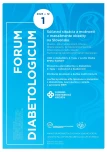-
Medical journals
- Career
Obesity as a cause of cardio-nephro-hepato-metabolic diseases
Authors: Ubomíra Fábryová 1,2,3
Authors‘ workplace: MetabolKLINIK s. r. o., Ambulancia pre diabetológiu, poruchy látkovej premeny a výživy, MED PED centrum, Bratislava 1; Biomedicínske centrum Slovenskej Akadémie Vied, Bratislava 2; Vysoká škola zdravotníctva a sociálnej práce sv. Alžbety, Inštitút prevencie a intervencie, Bratislava 3
Published in: Forum Diab 2023; 12(1): 11-18
Category:
Overview
Visceral obesity with endocrine dysfunction of adipose tissue and chronic adipogenic and vascular (systemic) subclinical inflammation, insulin resistance, oxidative stress significantly influence the development of cardiometabolic, renal, hepatic and other obesity comorbidities. In addition to genetic predisposition, risky lifestyle (excessive caloric intake, physical inactivity, sedentary life), aging (senescence), intestinal microbiota dysbiosis, chronic infections, lack of sleep and xenobiotics also contribute to the development of the mentioned disorders. For a better understanding, as well as the development of new preventive and treatment strategies, we need to identify and characterize the mechanisms underlying the relationship between obesity and its associated chronic diseases. A breakthrough years ago was the discovery that adipose tissue is an active endocrine organ producing protein hormones and a number of other substances with an endocrine, paracrine, or autocrine effect. These substances are significantly involved in the regulation of glucose and lipid metabolism, food intake, modulation of immune and inflammatory processes. Many of these may represent the sought-after links between adipose tissue dysfunction in obesity and obesity-related cardio-metabolic, renal, and hepatic diseases.
Keywords:
liver diseases – cardiovascular diseases – insulin resistance – chronic subclinical inflammation – dysfunctional adipose tissue – kidney diseases – visceral obesity
Sources
1. Fábryová Ľ et al. Štandardné diagnostické a terapeutické postupy v manažmente obézneho jedinca. MZSR: 2021. Dostupné z WWW: <https://www.health.gov.sk/?Standardne-Postupy-V-Zdravotnictve>.
2. Fábryová Ľ. Obezita a jej manažment. In: Martinka E (ed) et al. 2021 Konsenzuálne odporúčania Slovenskej diabetologickej asociácie (SDiA) a Slovenskej diabetologickej spoločnosti (SDS) pre liečbu diabetes mellitus 2. typu. Forum Diab 2021; 10(Suppl 2): 180–187.
3. Yao L, Herlea-Pana O, Heuser-Baker J et al. Roles of the chemokine system in development of obesity, insulin resistance, and cardiovascular disease. J Immunol Res 2014. 2014 : 181450. Dostupné z DOI: <http://dx.doi.org/10.1155/2014/181450>.
4. Guerreiro VA, Carvalho D, Freitas P. Obesity, Adipose Tissue, and Inflammation Answered in Questions. J Obes 2022; 2022 : 2252516. Dostupné z DOI: <http://dx.doi.org/10.1155/2022/2252516>.
5. Koenen M, Hill MA, Cohen P et al. Obesity, Adipose Tissue and Vascular Dysfunction. Circ Res 2021; 128(7): 951–968. Dostupné z DOI: <http://dx.doi.org/10.1161/CIRCRESAHA.121.318093>.
6. Cai Z, Huang Y, He B. New Insights into Adipose Tissue Macrophages in Obesity and Insulin Resistance. Cells 2022; 11(9): 1424. Dostupné z DOI: <http://dx.doi.org/10.3390/cells11091424>.
7. Whitlock G, Lewington S, Sherliker P et al. Body-mass index and cause-specific mortality in 900 000 adults: collaborative analyses of 57 prospective studies. Lancet 2009; 373(9669): 1083–1096. Dostupné z DOI: <http://dx.doi.org/10.1016/S0140–6736(09)60318–4>.
8. Csige I, Ujvárosy D, Szabó Z et al. The Impact of Obesity on the Cardiovascular System. J Diabetes Res 2018; 2018 : 3407306. Dostupné z DOI: <http://dx.doi.org/10.1155/2018/3407306>.
9. Mandviwala T, Khlaid U, Deswal A. Obesity and Cardiovascular Disease: a Risk Factor or a Risk Marker? Curr Atheroscler Rep 2016; 18(5): 21. Dostupné z DOI: <http://dx.doi.org/10.1007/s11883–016–0575–4>.
10. Koliaki C, Liatis S, Kokkinos A. Obesity and cardiovascular disease: revisiting an old relationship. Metabolism 2019; 92 : 98–107. Dostupné z DOI: <http://dx.doi.org/10.1016/j.metabol.2018.10.011>.
11. Fábryová Ľ. Obezita, diabetes mellitus (diabezita) a kardiovaskulárne ochorenia: nebezpečná metabolická triáda. Forum Diab 2019; 8(3): 178–183.
12. Elagizi A, Kachur S, Milani V et al. An Overview and Update on Obesity and the Obesity Paradox in Cardiovascular Diseases. Prog Cardiovasc Dis 2018; 61(2): 142–150. Dostupné z DOI: <http://dx.doi.org/10.1016/j.pcad.2018.07.003>.
13. Kim SH, Despres JP, Kon KK. Obesity and cardiovascular disease: friend or foe?n Eur Heart J 2016; 37(48): 3560–3568. Dostupné z DOI: <http://dx.doi.org/10.1093/eurheartj/ehv509>.
14. Câmara NO, Iseki K, Kramer H et al. Kidney disease and obesity: epidemiology, mechanisms and treatment. Nat Rev Nephrol 2017; 13(3): 181–190. Dostupné z DOI: <http://dx.doi.org/10.1038/nrneph.2016.191>.
15. García-Carro C, Vergara A, Bermejo S et al. A Nephrologist Perspective on Obesity: From Kidney Injury to Clinical Management. Front Med (Lausanne) 2021; 8 : 655871. Dostupné z DOI: <http://dx.doi.org/10.3389/fmed.2021.655871>.
16. Younossi ZM. Non-alcoholic fatty liver disease – A global public health perspective. J Hepatol 2019; 70(3): 531–544. Dostupné z DOI: <http://dx.doi.org/10.1016/j.jhep.2018.10.033>.
17. Gutiérrez-Cuevas J, Santos A, Armendariz-Borunda J. Pathophysiological Molecular Mechanisms of Obesity: A Link between MAFLD and NASH with Cardiovascular Diseases. Int J Mol Sci 2021; 22(21): 11629. Dostupné z DOI: <http://dx.doi.org/10.3390/ijms222111629>.
18. Papatheodoridi AM, Chrysavgis L, Koutsilieris M et al. The Role of Senescence in the Development of Nonalcoholic Fatty Liver Disease and Progression to Nonalcoholic Steatohepatitis. Hepatology 2020; 71(1): 363–374. Dostupné z DOI: <http://dx.doi.org/10.1002/hep.30834>.
19. Brandl K, Schnabl B. Intestinal microbiota and nonalcoholic steatohepatitis. Curr Opin Gastroenterol 2017; 33(3): 128–133. Dostupné z DOI: <http://dx.doi.org/10.1097/MOG.0000000000000349>.
Labels
Diabetology Endocrinology Internal medicine
Article was published inForum Diabetologicum

2023 Issue 1-
All articles in this issue
- Zhodnotenie súčasnej situácie a možností v manažmente obezity na Slovensku
- Obesity as a cause of cardio-nephro-hepato-metabolic diseases
- Specifics of pharmacotherapy in obese patients
- Current recommendations for dietary treatment of obesity
- Psychological care for patients before and after bariatric/metabolic surgery
- Chronic kidney disease in type 2 diabetics and findings from the EMPA-KIDNEY study
- Where are we and where are we headed in the prevention of atherosclerosis in patients with type 2 diabetes
- Atrial fibrillation and metformin treatment
- Prescription of alfa-lipoic acid to the patients with diabetic neuropathy in accordance with evidence-based medicine
- Forum Diabetologicum
- Journal archive
- Current issue
- Online only
- About the journal
Most read in this issue- Prescription of alfa-lipoic acid to the patients with diabetic neuropathy in accordance with evidence-based medicine
- Specifics of pharmacotherapy in obese patients
- Psychological care for patients before and after bariatric/metabolic surgery
- Obesity as a cause of cardio-nephro-hepato-metabolic diseases
Login#ADS_BOTTOM_SCRIPTS#Forgotten passwordEnter the email address that you registered with. We will send you instructions on how to set a new password.
- Career

